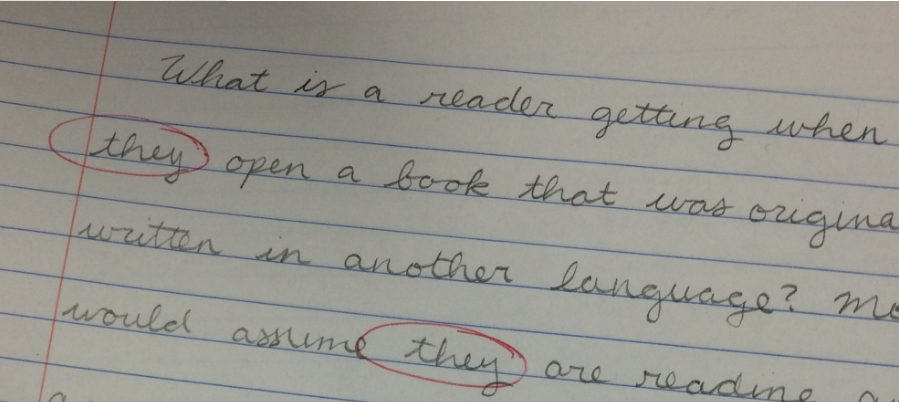Your English teacher is wrong
October 16, 2014
Your English teacher has probably told you that they don’t tolerate the “singular they.” I just used it in that last sentence: reread it if you didn’t notice. I should have said “Your English teacher has probably told you that he or she doesn’t tolerate the ‘singular they.’” This is ridiculous. I’ve always been the person who corrects everyone’s grammar (I’m so sorry if you’ve ever had me edit a paper) but after developing an obsession with linguistics and learning how language comes into being, I’ve changed my mind about certain topics.
What is the singular they? First, think back to your English classes. He/his, she/her/hers, it/its, they/their/theirs: these are all pronouns you learned in elementary school. You use pronouns instead of repeating a person’s name over and over (because “Jane found out that Jane’s dog was sick and Jane had to take Jane’s dog out of Jane’s house to Jane’s dog’s vet” will earn you weird stares). For a third person singular pronoun, we usually use “he” or “she,” assuming we know a person’s gender. But we often don’t. What then? It’s awkward to use “he or she” and it certainly doesn’t encompass all the possible pronouns a person could use.
I now present you with the following sets of words: xe/xem/xyr, ey/em/eir, and ze/zir/zirs. They’re pronouns! While these may seem unfamiliar to you, plenty of people worldwide utilize alternative pronouns, mainly because he/his and she/her/hers usually denote a particular gender identity that an individual may want to avoid. I try to avoid assigning genders to people I don’t know because I have no idea how they identify. Therefore using the singular they to make others comfortable is extremely important to me.
Even if that’s not your goal, you still use the singular they nearly every day. Say your friend just went to a job interview. You might ask, “What was your interviewer like? Were they nice?” When was the last time you said “What was he or she like?” Consider this the next time you’re talking to a friend.
“But Lauren,” you might be thinking, “colloquial English shouldn’t be used in formal papers!” You are correct. Your next English essay probably shouldn’t include hashtags, slang, or swear words. Your English teacher might have also explicitly instructed you to avoid the singular they, in which case it might be better for you to abide by their rules rather than fight over a ten-point assignment (Notice I just used the singular they there. See how convenient it is?).
That said, the singular they isn’t only present in colloquial English: plenty of writers utilized the singular they. If you memorize some of the quotes (not that I’ve done this, as that would be terribly nerdy and… okay, yes, I’ve done this), you can impress or annoy your teachers. They’ll still tell you to change your words, but you’ll have proven that you know your stuff. And what stuff it is! Chaucer, Shakespeare, and Austen have all used the singular they in some of their most memorable works.
Language belongs to the people. Most of our spoken and written English customs designate certain patterns of speech as incorrect (zero copula, dropping the genitive case -’s, and other types of speech common in AAVE), despite their frequency. The fact that the singular they is so common in colloquial English should mean something to those who write our language’s rules. Years from now, the singular they will be accepted by nearly everyone, including professors. If a person can make others feel more at ease while making their own written and spoken English more concise, why wouldn’t they?



























